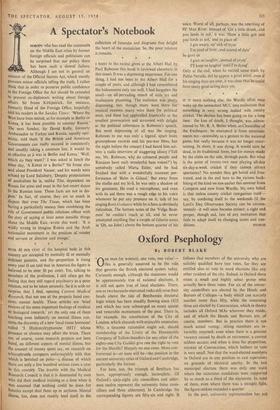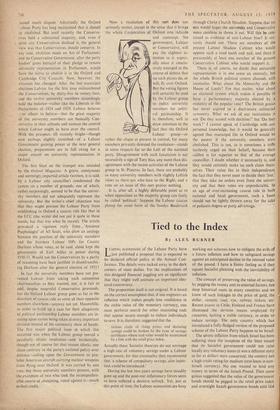Oxford Psephology
By ROBERT BLAKE
crlk NE man (or woman), one vote, one value'— kj this is generally assumed to be the rule that governs the British electoral system today. Curiously enough, although the statement would be approximately true of national elections, it is still not quite true of local elections. There, one or two barnacle-encrusted rocks still raise their heads above the tide of Benthamite electoral logic which has been steadily flowing since 1832 and which has now submerged so many quaint and venerable monuments of the past. There is, for example, the constitution of the City of London, which abounds with enjoyable anomalies. Why, a tiresome rationalist might ask, should membership of the Livery of the Honourable Company of Tallowchandlers (or any other of the eighty-one City Guilds) give one the right to vote for the Sheriffs? Happily no one cares. More con- troversial is—or soon will be—the position in the ancient university cities of Oxford and Cambridge, particularly the former.
For here, too, the triumph of Bentham has been, appropriately enough, incomplete. Of Oxford's sixty-eight city councillors and alder- men twelve represent the university (nine coun- cillors and three aldermen). In Cambridge the corresponding figures are fifty-six and eight. It follows that members of the university who are suitably qualified have two votes, for they are entitled also to vote in ward elections like any other resident of the city. Indeed, in Oxford there exists a small and highly select group who actually have three votes. For six of the univer- sity councillors are elected by the Heads and Bursars of Colleges—a body which can scarcely number more than fifty, while the remaining three are elected by Convocation, which in theory includes all Oxford M As wherever they reside, and of which the Heads and Bursars are, of course, members. But in practice there is not much actual voting : sitting members are in- variably returned; even when there is a genuine vacancy caused by death or retirement, a contest seldom occurs; and when it does the proportion, anyway of Convocation, which bothers to vote is very small. Not that the ward-elected members in Oxford are ih any position to cast aspersions on grounds of electoral apathy. In the last municipal election there was only one ward where the victorious candidates were supported by as much as a third of the electorate. In most of them, even where there was 'a straight fight, the figure seldom exceeded a quarter.
In the past, university representation has not
.:aused much dispute. Admittedly the Oxford Labour Party has long maintained that it should be abolished. But until recently the Conserva- tives held a substantial. majority, and, even if some city Conservatives disliked it, the general view was that Conservatives should conserve. In any case, abolition needs an Act of Parliament, and no Conservative Government, after the party leaders' gross betrayal of their pledge to restore university representation in Parliament, would have the nerve to abolish it in the Oxford and Cambridge City Councils. Now, however, the situation has changed. After the last municipal elections Labour for the . first time outnumbered the Conservatives, by thirty-five to twenty-four, and the twelve university members accordingly hold the balance—rather like the Liberals in the ParliaMents of 1924 and 1929. Labour, believes --or affects to believe—that the great majority of the university members are basically Con- servative in their attitude and menace the control which Labour ought to have over the council. With the prospect, till recently bright—though now perhaps slightly tarnished—of a Labour Government gaining power at the next general election, preparations are in full swing for a major assault on university representation in Oxford.
The first blast on the trumpet was sounded by the Oxford Magazine. A grave, anonymous and seemingly.impartial article (written, it is said, by a Labour city councillor) condemned the system on a number of grounds, one of which, rather surprisingly, seemed to be that the univer- sity members did not adequately represent the university. But .the writer's chief objection was that they might prevent the Labour Party from establiShing in Oxford a caucus rule like that in the LCC (the writer did not put it quite in these words, but that was what he meant). The article provoked a vigorous reply from . 'Amateur Psephologist' of All Souls, whO drew an analogy between the position of the university members and the fourteen Labour MPs for County Durham whose votes, so he said, alone kept the government of Earl Attlee in power during 1950-51. Would not the Conservatives by a parity of reasoning have been justified in disenfranchis- ing Durham alter the general 'election of 1951?
In fact the university members have not pre- vented Labour from taking such committee chairmanships as they wanted, nor; it is fair to add, despite mournful Conservative jeremiads, has the Oxford Labour group gone as far in the direction of caucus rule as some of their opposite numbers elsewhere—anyway not yet. Meanwhile, in order to build up a case for their allegations of political partisanship Labour members are in- sisting upon naines being taken at every important division instead of the customary shOw of hands. The first major political issue at which this occurred was when the Labour. group moved a peculiarly idiotic resolution—and incidentally, 'though not of course for that reason idiotic, one clean contrary to the party'S national policy over defence—calling upon the Government to pro- hibit,American. aircraft carrying nuclear weapons from flying over Oxford. It was carried by one vote, but those university members present, with the exception of two who took the incomprehen- sible course of abstaining, voted against it—much to their credit. It is, after all, a highly debatable point as to when opposition to the majority group can fairly be called 'political.' Suppose the Labour caucus plump for some form of the Sandys Boulevard
through Christ Church Meadow. Suppose that (as one would hope) the university and Conservative votes combine to throw it out. Will this be con- strued as evidence of anti-Labour bias? It cer- tainly should not. There are members of the present Labour Shadow Cabinet who would oppose such a road tooth and nail, and there is presumably at least one member of the present Conservative Cabinet who would support it.
There is, of course, no doubt that university representation is in one sense an anomaly, but the whole British political system abounds with anomalies. What about the Monarchy and the House of Lords? For that matter, what about an electoral system which makes it possible to havle a parliamentary majority elected by a minority of the popular vote? The British genius has never aspired to a doctrinaire utilitarian symmetry. What we ask of our institutions is not 'Do they accord with doctrine?' but 'Do they work?' I cannot speak of Cambridge with any personal knowledge, but it would be generally agreed that municipal life in Oxford would be the poorer if the university members were abolished. This is not, as is sometimes a trifle tactlessly urged on their behalf, because their calibre is far superior to that of the average councillor...1 doubt whether it necessarily is, and they would certainly make no such claim them- selves. Their value lies in their independence, the fact that they never meet to decide their 'line,' that they take no orders even from the univer- sity and that their votes are unpredictable. In an age of ever-increasing caucus rule in both national and local government, such a boon should not be lightly thrown 'away for the sake of pedantic dogma or party advantage.































 Previous page
Previous page